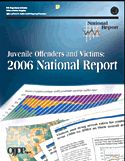
All OJJDP publications may be viewed and downloaded at ojjdp.ncjrs.gov/publications. Print publications may also be ordered from the Juvenile Justice Clearinghouse (order online at puborder.ncjrs.gov or call 800-851-3420).
Now Available
Juvenile Residential Facility Census 2002: Selected Findings. Presents findings from the 2002 Juvenile Residential Facility Census, including statistics on facilities and offenders by state and facility type; and national data on facility confinement features, overcrowding, suicide and mental health screening, and deaths in custody. (National Report Series Bulletin, June 2006, NCJ 211080)
National Youth Gang Survey, 1999-2001. Presents findings from the National Youth Gang Surveys for 1999, 2000, and 2001, with selected earlier trends and preliminary findings for 2002. Topics include the prevalence of youth gangs, the number of jurisdictions with active gangs, the number of gangs and gang members, gang member characteristics, youth gangs and crime, law enforcement responses, and perceptions of the gang problem. (Summary, July 2006, NCJ 209392)
Expanded Version of National Report Available Online
 Juvenile Offenders and Victims: 2006 National Report, OJJDP's flagship statistical publication, presents the latest available data on juvenile offending and victimization and the activities of the juvenile justice system, including law enforcement agencies, courts, and corrections. This comprehensive, reliable report compiles data from a variety of sources and presents a wide range of information in hundreds of easy-to-read tables, graphs, and maps—all accompanied by analysis in clear, nontechnical language. The report's chapters mirror the topical organization of OJJDP's online Statistical Briefing Book.
Juvenile Offenders and Victims: 2006 National Report, OJJDP's flagship statistical publication, presents the latest available data on juvenile offending and victimization and the activities of the juvenile justice system, including law enforcement agencies, courts, and corrections. This comprehensive, reliable report compiles data from a variety of sources and presents a wide range of information in hundreds of easy-to-read tables, graphs, and maps—all accompanied by analysis in clear, nontechnical language. The report's chapters mirror the topical organization of OJJDP's online Statistical Briefing Book.
To enhance the utility of the 2006 National Report, OJJDP and the National Center for Juvenile Justice have created an expanded online version in the Briefing Book. This user-friendly online resource presents the full report and individual chapters in PDF format, together with the following special features:
- An overview of the report, content summaries for individual chapters, and statistical highlights.
- Excel tables presenting data points for graphs.
- Powerpoint presentations of graphs and maps.
The National Report offers a clear view of juvenile crime and the justice system's response at the beginning of the 21st century. It is an indispensable resource for informed professionals, and the expanded online version makes its wealth of information even more accessible.
| Inside the National Report
Chapter 1: Juvenile Population Characteristics
|
| Juvenile population demographics
Juveniles in poverty
Living arrangement of juvenile
|
Births to teens
School dropouts
|
|
Chapter 2: Juvenile Victims
|
| Homicide victims
Juvenile suicide
Victimization survey
Victims of school crimes
Risk factors
Offenders who victimize juveniles
Victims of violent crimes
|
Time-of-day and location analyses
Victims of statutory rape
Victimization on the Internet
Kidnapping
Missing children
Child maltreatment
Foster care and adoption
|
|
Chapter 3: Juvenile Offenders
|
| Self-reports vs. official data
Homicides by juveniles
Juvenile offending behavior
Offending into the adult years
School crime
|
Weapons use
Drug and alcohol use
Gangs
Time-of-day analysis
|
|
Chapter 4: Juvenile Justice System Structure and Processs
|
| History and overview
Supreme Court cases
State definitions of juvenile court jurisdiction
Case processing
Public access to juvenile proceedings
|
State provisions for trying juveniles
as adults
Judicial waiver, concurrent jurisdiction,
and statutory exclusion
Blended sentencing
Juveniles in the federal justice system
|
|
Chapter 5: Law Enforcement and Juvenile Crime
|
| Gender, age, and racial variations in juvenile arrests
Juvenile proportion of arrests
Arrests of females and young juveniles
Juvenile arrest trends by detailed offense
Juvenile crime vs. adult crime
|
Clearance statistics
Violent and property crime arrest rates
by state and county
Police disposition of juvenile arrests
|
|
Chapter 6: Juvenile Offenders in Court
|
| Delinquency caseload and trends
Gender, racial, and age variations
Offense profiles by gender
Detention
Formal vs. informal case processing
Adjudication
Disposition
|
Delinquency case processing
Judicial waiver
Monitoring racial disparity
in the justice system
Status offense cases
|
|
Chapter 7: Juvenile Offenders in Correctional Facilities
|
| Juvenile custody population
Offense trends in private and public facilities
Detained and committed populations
State custody rates
Offense profiles of detained and committed offenders by state
Gender and racial variations in the custody population
Length of stay
Types of facilities
Facility security features
|
Facility size and crowding
Screening for substance abuse, mental
health, and suicide risk
Deaths in custody facilities
Sexual violence in custody facilities
Youth reentry population
Recidivism
Juveniles in jails and prisons
Death penalty
|
|
|


 Juvenile Offenders and Victims: 2006 National Report, OJJDP's flagship statistical publication, presents the latest available data on juvenile offending and victimization and the activities of the juvenile justice system, including law enforcement agencies, courts, and corrections. This comprehensive, reliable report compiles data from a variety of sources and presents a wide range of information in hundreds of easy-to-read tables, graphs, and maps—all accompanied by analysis in clear, nontechnical language. The report's chapters mirror the topical organization of OJJDP's online Statistical Briefing Book.
Juvenile Offenders and Victims: 2006 National Report, OJJDP's flagship statistical publication, presents the latest available data on juvenile offending and victimization and the activities of the juvenile justice system, including law enforcement agencies, courts, and corrections. This comprehensive, reliable report compiles data from a variety of sources and presents a wide range of information in hundreds of easy-to-read tables, graphs, and maps—all accompanied by analysis in clear, nontechnical language. The report's chapters mirror the topical organization of OJJDP's online Statistical Briefing Book.